
Lepidoptera is an order of insects that includes butterflies and moths. About 180,000 species of the Lepidoptera are described, in 126 families and 46 superfamilies, 10 percent of the total described species of living organisms. It is one of the most widespread and widely recognizable insect orders in the world. The Lepidoptera show many variations of the basic body structure that have evolved to gain advantages in lifestyle and distribution. Recent estimates suggest the order may have more species than earlier thought, and is among the four most speciose orders, along with the Hymenoptera, Diptera, and Coleoptera.
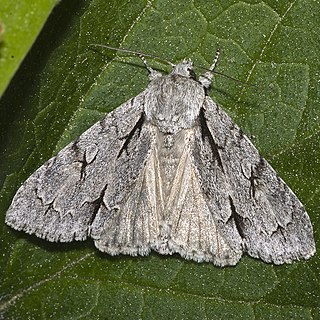
The grey dagger is a moth of the family Noctuidae.

Sparganothis pilleriana, also known as the vine leafroller tortrix, is a moth of the family Tortricidae found in the Palearctic realm. It was first described by the Austrian lepidopterists Michael Denis and Ignaz Schiffermüller in 1775.

Coleophora gryphipennella is a moth of the family Coleophoridae. It is found in most of Europe, from Fennoscandia to the Iberian Peninsula and Italy and from Ireland to the Black Sea.

Anacampsis populella is a moth of the family Gelechiidae, which is native to Europe and has been accidentally introduced to North America. It was first described in 1759 by Carl Alexander Clerck, a Swedish entomologist. The type specimen is from Sweden. The foodplants of the larvae are poplars and willows.
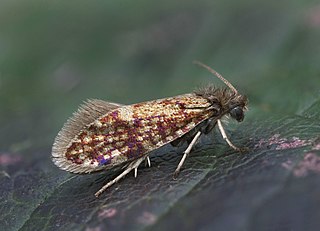
Eriocrania cicatricella is a moth of the family Eriocraniidae found in Europe. It was first described by Johan Wilhelm Zetterstedt in 1839. The larvae mine the leaves of birch.

Eriocrania sparrmannella also known as the mottled purple is a moth of the family Eriocraniidae, found in Europe and Japan. It was first described by the French entomologist, Louis Augustin Guillaume Bosc in 1791. The specific name honours the Swedish naturalist Anders Erikson Sparrman. The larvae mine the leaves of birch.

Ditula angustiorana, the red-barred tortrix, is a moth of the family Tortricidae found in Africa, Asia, Europe and North Africa. Other common names are the fruit-tree tortrix and the vine tortrix. The moth was first described by Adrian Hardy Haworth in 1811.
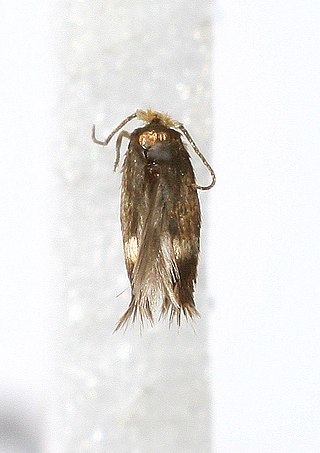
Stigmella microtheriella is a moth of the family Nepticulidae, found in Asia, Europe and New Zealand. The larvae mine the leaves of hazel and hornbeams. It was described by the English entomologist, Henry Tibbats Stainton in 1854 from a type specimen found in England.

The rose leaf miner is a moth of the family Nepticulidae. It is found in all of Europe, east to the eastern part of the Palearctic realm.
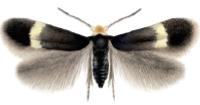
Stigmella centifoliella is a moth of the family Nepticulidae. It is found from Scandinavia to the Iberian Peninsula, Italy, Albania and Greece, and from Great Britain to Ukraine. It is also present in North Africa.
Stigmella rolandi is a moth of the family Nepticulidae. It is found from Germany to the Iberian Peninsula, Sardinia, Italy and Greece, and from France to central en southern Russia. It is also present in the Near East.

Ectoedemia angulifasciella is a moth of the family Nepticulidae. It is found in most of Europe, except the Mediterranean Islands.

Lycia zonaria, the belted beauty, is a moth of the family Geometridae. The species was first described by Michael Denis and Ignaz Schiffermüller in 1775 and it is found in most of Europe.

Synanthedon bibionipennis, the strawberry crown moth, is a moth of the family Sesiidae. It is found in western North America from Montana south to Texas westward to the Pacific coast and from British Columbia to California. It is an introduced species in Hawaii.
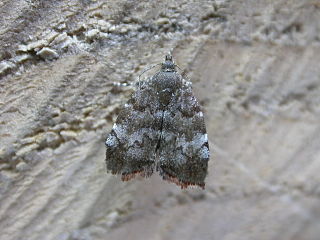
Choreutis pariana, the apple-and-thorn skeletonizer or apple leaf skeletonizer, is a moth of the family Choreutidae. The moth was first described by the Swedish entomologist Carl Alexander Clerck in 1759. It is native to Eurasia and was introduced to New England, USA in 1917.

Aethes kindermanniana is a species of moth of the family Tortricidae. It was described by Treitschke in 1830. It is found on Sardinia and in Denmark, Germany, France, Spain, Italy, Switzerland, Austria, the Czech Republic, Slovakia, Poland, Hungary, Romania, Norway, Sweden, Finland, the Baltic region, Ukraine, Russia. and Asia Minor. It has also been recorded from North America.

Choristoneura longicellanus is a species of moth of the family Tortricidae. It is found in China, Japan, Taiwan, the Korean Peninsula and the Russian Far East.
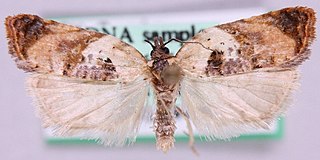
Acleris permutana is a species of moth of the family Tortricidae. It is found in Ireland, Great Britain, Portugal, Spain, France, Belgium, the Netherlands, Germany, Denmark, Sweden, Austria, Italy, the Czech Republic, Slovakia, Slovenia, Croatia, Hungary, Romania, North Macedonia and Russia. The habitat consists of coastal sandhills and limestone.
















